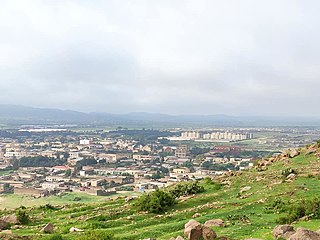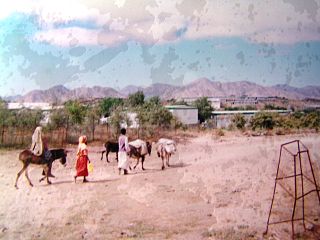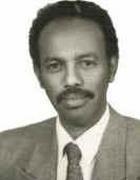
The Elabared Estate is a Government operated cooperative immediately outside the small town of Elabored, Eritrea.

The Elabared Estate is a Government operated cooperative immediately outside the small town of Elabored, Eritrea.
In 1908 Pietro Casciani, an Italian colonial immigrant was granted a plot of 10 km2 and planted grains. In 1958 Fratelli De Nadai purchased Pietro Casciani's land and replanted with citrus for export. During the ownership of De Nadai there was a great expansion of goods produced at the plantation, with the addition of a canning plant, dairy factory and winery. [1]
Production fluctuated during the Eritrean War of Independence, specifically after the massacre of the elders in the nearby village. The Estate was nationalized by the Derg in 1975 but was liberated by the Eritrean People's Liberation Front (EPLF) in 1977. In that same year however, the EPLF withdrew in what was called the Strategic Withdrawal.
After Independence the EPLF (later the People's Front for Democracy and Justice) offered the plantation to private capital [1] however, no buyers availed themselves of the opportunity.

Isaias Afwerki is an Eritrean politician and partisan who has been the first and only president of Eritrea since 1993. In addition to being president, Isaias has been the chairman of Eritrea's sole legal political party, the People's Front for Democracy and Justice (PFDJ).

The People's Front for Democracy and Justice is the founding, ruling, and sole legal political party of the State of Eritrea. The successor to the Marxist–Leninist Eritrean People's Liberation Front (EPLF), the PFDJ regards itself as a left-wing nationalist party, though it holds itself open to nationalists of any political affiliation. The leader of the party and current President of Eritrea is Isaias Afwerki. The PFDJ has been described as totalitarian, and under its rule Eritrea reached the status of the least electorally democratic country in Africa according to V-Dem Democracy indices in 2023.

The Eritrean People's Liberation Front (EPLF), colloquially known as Shabia, was an armed Marxist–Leninist organization that fought for the independence of Eritrea from Ethiopia. It emerged in 1973 as a far-left to left-wing nationalist group that split from the Eritrean Liberation Front (ELF). After achieving Eritrean independence in 1991, it transformed into the People's Front for Democracy and Justice (PFDJ), which serves as Eritrea's sole legal political party.

Dekemhare is a town in Eritrea in the Southern Region, southeast of the national capital of Asmara. During the Italian colonial period, the town became a major center of industry and agriculture known for its vineyards. The town became known for Art Deco buildings built during the colonial period.

Nakfa, Tigrinya: ናቕፋ, is a town in the Northern Red Sea region of Eritrea. It is also the name of a sub region of Eritrea.

The Eritrean Liberation Front, colloquially known as Jebha, was the main independence movement in Eritrea which sought Eritrea's independence from Ethiopia during the 1960s and the early 1970s.

The Eritrean War of Independence was an armed conflict and insurgency aimed at achieving self-determination and independence for Eritrea from Ethiopian rule. Starting in 1961, Eritrean insurgents engaged in guerrilla warfare to liberate Eritrea Province from the control of the Ethiopian Empire under Haile Selassie and later the Derg under Mengistu. Their efforts ultimately succeeded in 1991 with the fall of the Derg regime.

Petros Solomon is an Eritrean politician. He was an Eritrean People's Liberation Front commander and played a key role during the Eritrean War of Independence, following independence he served in several positions in the Cabinet, including Minister of Defense and Minister of Foreign Affairs.

Sebhat Ephrem is an Eritrean military officer and politician who is the Minister of Energy and Mines for Eritrea. He was also the former Minister of Defence and former Eritrean People's Liberation Front (EPLF) commander during the Eritrean War of Independence.
Haile Woldense or Woldetensae is an Eritrean politician.
Alamin Mohammed Seid was an Eritrean politician.
The First Battle of Massawa took place from 1977 to 1978 in and around the coastal city of Massawa. The port was besieged by the Eritrean People's Liberation Front (EPLF) against the forces of Ethiopia and was one of two battles in and around the city.
The siege of Barentu took place in 1977 in and around the town of Barentu. It was jointly laid to siege by the Eritrean Liberation Front (ELF) and the Eritrean People's Liberation Front (EPLF) against the forces of Ethiopia.
The Eritrean Air Force (ERAF) is the air service branch of the Eritrean Defence Forces.

The Eritrean Civil Wars were two conflicts that were fought between competing organizations for the liberation of Eritrea.

Eritrea–Israel relations are foreign relations between Eritrea and Israel. Both countries established diplomatic relations in 1993 following Eritrean independence. Eritrea has an embassy in Ramat Gan and Israel had an embassy in Asmara, that was closed in 2022. Their ties were considered as very close, but after 2020 relations worsened. Both Eritrea and Israel have shared access to the Red Sea.

The Saho People's Democratic Movement (SPDM) is an organized group in Eritrea, fighting for the self-determination of the Saho people. They are allied with the Red Sea Afar Democratic Organisation (RSADO), whom they have done joint operations with. The organization was founded in 1984, during the Eritrean War of Independence, and played a significant role in the struggle against Ethiopian rule.
Throughout the history of Eritrea, women have played an active role.
Genet Sium is an Eritrean writer, activist, and nurse. She was an active member of the Eritrean People's Liberation Front (EPLF) during the war for Eritrean independence from Ethiopia. Her autobiographical novel Shigom recounts her experiences as a freedom fighter. She has subsequently written several works of fiction as well as texts on sexual and reproductive health.

The fallof the Derg was a military campaign that resulted in the defeat of the ruling Marxist–Leninist military junta, the Derg, by the rebel coalition Ethiopian People's Revolutionary Democratic Front (EPRDF) on 28 May 1991 in Addis Ababa, ending the Ethiopian Civil War. The Derg took power after deposing Emperor Haile Selassie and the Solomonic dynasty, an imperial dynasty of Ethiopia that began in 1270. The Derg suffered from insurgency with different factions, and separatist rebel groups since their early rule, beginning with the Ethiopian Civil War. The 1983–1985 famine, the Red Terror, and resettlement and villagization made the Derg unpopular with the majority of Ethiopians tending to support insurgent groups like the Tigray People's Liberation Front (TPLF) and Eritrean People's Liberation Front (EPLF).